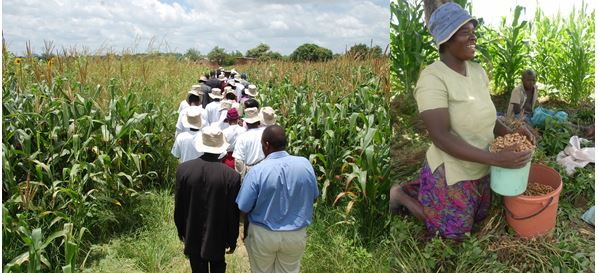Given the disparate nature of smallholder production in developing countries, it is often very difficult for buyers, development actors and policy makers to get an accurate sense of the scale and demand for agricultural services including inputs. Equally difficult is estimating the volume of commodities that can be consistently supplied to the market by a farming community for a particular period. In short, verifying and purifying demand, experiences and expectations remains a mammoth task. Without granular details, most agricultural interventions are equivalent to shooting in the sky.
Enter digital technology
While many formal organizations such as financial institutions and supermarkets think they can continue influencing farmers and consumers through traditional advertising, digital technology is forcing them to re-visit their strategies. Farmers, traders and consumers are increasingly becoming empowered to personalize their information, thanks to social media. Using social media, farmers can now hear what others are saying about particular agricultural inputs, markets and products more than was the case a few decades ago. Through online agricultural platforms, digital technology is opening up exciting possibilities for farmers and traders to influence each other seamlessly. Input providers and equipment manufacturers have to start going beyond road shows, radio and newspaper advertisements to influence farmers and other actors. Farmers and consumers are becoming empowered to tease out reality from hype. They are no longer passive recipients of whatever comes and can see that some products are promoted as if they perform wonders when the reality is different.

Agricultural switch board
Regular messages enable farmers, traders and consumers to verify and purify the demand for commodities in the market. This is unlike in formal organizations where messages are expected to trickle down from head office to the grassroots. Agricultural platforms are increasingly becoming switchboards for messages. The platform can expose the truth and hold input providers such as seed companies and banks accountable. An accurate picture of farmer capacity is also revealed.
Increasing awareness of opportunity costs
Through a digital platform, farmers can take their cue from their peers who participate in the market regularly. A farmers’ decision to stay with a particular commodity now depend on ability to find meaning and purpose in it. Using ICTs to communicate with each other and make a few calculations, farmers can tell that they are receiving a raw deal from contract arrangements. They are now also more aware of opportunity cost as a determinant of success. Receiving less money today is better than receiving more after two weeks, according to farmers and traders in Mbare market of Harare.
Enhancing the power of stories
The use of podcasting and video technology is retrieving and gathering stories from farmers and traders in real-time. Given their reliance on memory, for farmers and traders, stories are the best ways of remembering agricultural activities. Through stories captured on digital platforms, farmers and traders have a sincere feeling of being involved in agricultural transformations that shape the direction of their farming activities. They can engage in online debates about agribusiness opportunities. Such deep conversations cannot be sufficiently harvested through formal media.
In the market, each farmer and trader contributes stories and jokes which spice collective experiences. Interpersonal relationships that are built have a bearing on how well farmers and traders perform. Powered by mobile technology, farmers and traders are able to grow their networks through crowd-sourcing new ideas. Connectivity in the market enhances market research. Individual and group experiences filtered and purified for every participant’s benefit. Where a newspaper would devote less than a page to agricultural stories and radio would just have a brief session on agriculture, dedicated agricultural platforms deepen experiences by focusing entirely on agriculture issues.
Through agricultural platforms, farmers and traders can a chance to ask thought-provoking questions that are designed to help them promote themselves. Some farmers and traders stand out and get known as experts in particular commodities. This helps them make key connections and grow their agribusinesses. Most connections made online develop into deeper relationships when they move offline. Farmers who start off as shy gradually become vibrant contributors. The majority of farmers join agricultural platforms primarily to cultivate meaningful relationships, learn more about the market, buyers, consumers and other actors as well as position themselves for economic opportunities. Besides being an excellent source of quality connections, market-based agricultural platforms are outlets for constructive social listening.
Contacts
charles@knowledgetransafrica.com / charles@emkambo.co.zw / info@knowledgetransafrica.com
Website: www.emkambo.co.zw / www.knowledgetransafrica.com
eMkambo Call Centre: 0771 859000-5/ 0716 331140-5 / 0739 866 343-6
